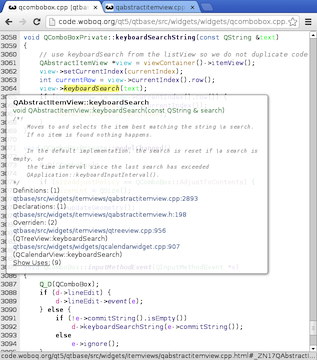Reputation: 6958
Where can I browse the sourcecode for libc online (like doxygen)
Sometimes I want to look up the implementations of functions in the stdlib, I've downloaded the sourcecode, but it's quite messy.
Just greping is not really suitable because of the many hits.
Does anyone know a webpage doxygen style that has the documentation.
The same goes for the linux kernel.
Thanks
Upvotes: 30
Views: 18743
Answers (6)
Reputation: 572
You should check if your distribution is using the vanilla GLIBC or the EGLIBC fork (Debian and Ubuntu have switched to EGLIBC EDIT: they switched back around 2014).
Anyway, the repository browser for GLIBC is at http://sourceware.org/git/?p=glibc.git
http://code.woboq.org/userspace/glibc/, posted by @guruz below, is a good alternative.
The source is a bit complicated by the presence of multiple versions of the same files.
Upvotes: 23
Reputation: 1614
You can try http://code.woboq.org/userspace/glibc/
It has nice navigation/hilighting similar to an IDE.
Upvotes: 7
Reputation: 9224
You can also get actual Doxygen-generated docs from http://fossies.org/dox/glibc.
Upvotes: 1
Reputation: 6048
How about this for libc documentation? And perhaps this for the kernel? There is also Google Code search; here is an example search.
More on Google Code Search You can enter search queries like this: package:linux-2.6 malloc for any references to malloc in the linux-2.6 kernel.
Edit: Google Code search is now shut down. But you can access the git repo at http://git.kernel.org/?p=linux/kernel/git/torvalds/linux-2.6.git and it has search as well.
Upvotes: 8
Reputation: 702
To help navigate the source to glibc, perhaps try something like ctags or cscope?
Note: I get dumber every time I look at the glibc source, so please be careful! :)
Upvotes: 3
Reputation:
If you are using GNU C (glibc), the functions (beyond the GNU extensions) follow the POSIX standard as far as their arguments, implementation, failure and return values. If you want to peek under the hood of static members, you'll have to look at the code.
Every push (that I can remember) to try and adopt something like Doxygen for glibc was rejected for the following reasons:
- Redundant, POSIX already documents almost everything thats exposed, as well as man and info pages.
- Too much work initially
- More work for maintainers
As far as the kernel goes, Linux does use a system very similar to Doxygen called Kerneldoc.
Upvotes: 1
Related Questions
- Where is the Android libc documentation?
- Where can I find the source code for all the C standard libraries?
- Where can I get the source code for Linux?
- OS X: Is it possible to view the source code of the Standard C Library?
- libc source location - for download or online viewing?
- what are the commonly used libc header files and their functionalities
- what is libc? what are the functions it includes? how can we get the source code of it?
- where can i find source code for libcrypto++?
- Where can get libc_p.so source code?
